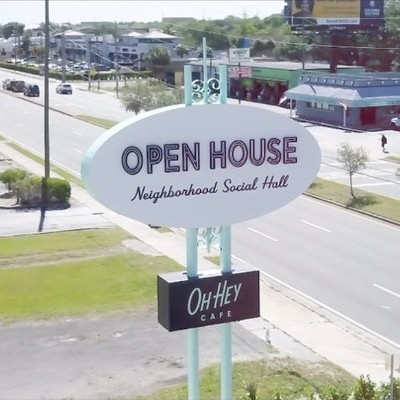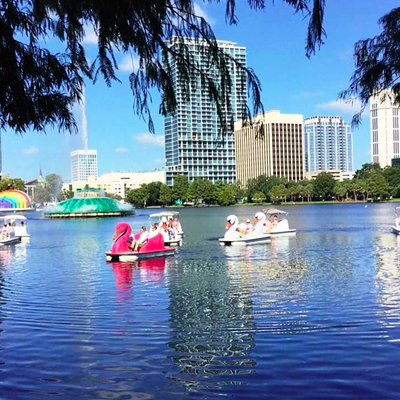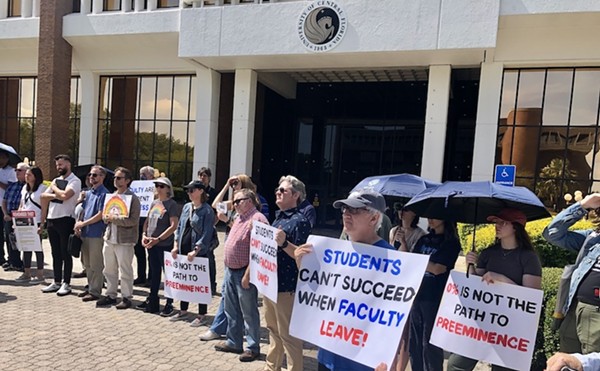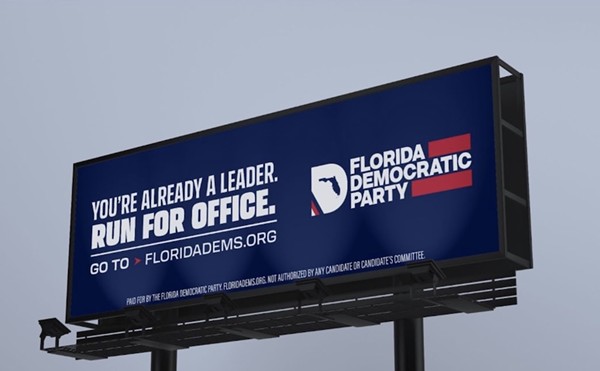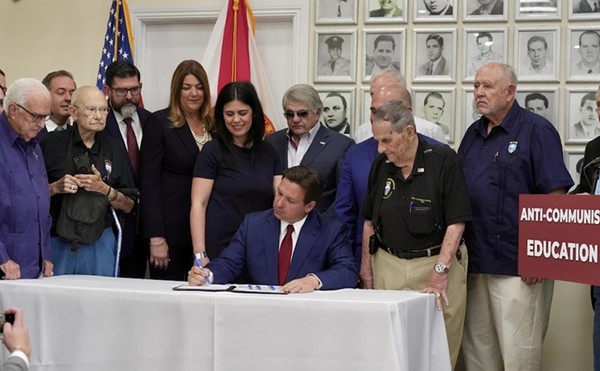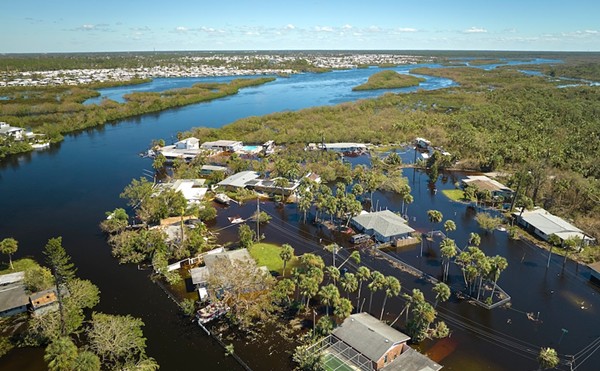By the time I join him, Buddy Dyer has already been canvassing College Park for three hours. It's a frigid Saturday afternoon, but the mayoral contender is cheerful as ever in his blue dress shirt, sleeves rolled up, tan slacks and tie. He announced his candidacy a week ago, and today is his first day going door-to-door.
"Hi, I'm Buddy Dyer," he tells every Oberlin Avenue resident he comes across. "I'm your neighbor from over on Bryn Mawr `Avenue`. I've been your state senator for the last 10 years, and now I'm running for mayor. I'd appreciate your consideration."
It's a line he'll recite probably 150 times today, and for the most part it's also the centerpiece of John H. Dyer Jr.'s campaign to replace Glenda Hood. Dyer, 44, isn't banking on ambitious plans or passionate appeals to win the Feb. 4 election. He's playing on the fact that he's just Buddy.
That should be enough to get him into a runoff at least. Dyer is Central Florida's highest profile Democrat. For three of his 10 years in the state Senate -- 1997 to 2000 -- he served as Senate minority leader. He staked out a reputation as a tireless advocate of better funding for education and making health care more accessible.
Yet he's also strained his relationship with core Democratic supporters by backing a partial-birth abortion ban and voting for pro-business contracting laws opposed by unions. Through it all he's maintained amicable relations with his GOP counterparts, and has crafted a moderate enough image to keep the rightest of wingers at bay.
His name recognition is head-and-shoulders above his competitors. And though he lost a brutal race for state attorney general in November to the overtanned and underqualified Charlie Crist, much of Dyer's political machine and fund-raising contacts remain. (Two days after announcing his candidacy, Dyer says he received $70,000 in financial commitments.) Plus he's a nice guy, with a warm smile and empathetic eyes.
Dyer is the most seasoned, most polished politician in the race. And he's just as clearly the front-runner, which he obviously knows. "In my 10 years in the `state` senate, I've represented 75 percent of the city," he says. Orlando is used to voting for Buddy Dyer, so he's pretty much on cruise control. Does that automatically grant him the coveted red chair on the dais? Is there substance to Dyer's style?
That's a hard question to answer. Dyer is so cautious, so cognizant of not saying the wrong thing that it's tough to push him beyond vague platitudes and into the meat of the city's most pertinent problems. He confesses, after two hours of togetherness, that he's more accustomed to TV-news softballs than spending quality time with a reporter. More than once, he admits to not having studied an issue enough to comment. Better to not say anything at all than to say something he'll regret. He does, however, side-step questions with a calming, reassuring charm. What he doesn't know, you come away thinking, he'll find out, and then do the right thing. You just have to trust him.
Which in itself offers insight on how a Buddy Dyer administration might run. He uses the term "consensus builder" far too often to be considered an impassioned, brazen advocate of anything. The man isn't out to raise hell.
For instance, Dyer unequivocally supports adding sexual orientation to the city's anti-discrimination ordinance, as the council did in December. But by his own admission, he wouldn't be the type to be out front driving the issue and pushing Orange County to adopt a similar law. It's the same level of commitment he showed in April 2001, when a group of gay high-school students lobbied him to sponsor a statewide equal-protection law. The students had just been browbeaten by then-state Rep. Allen Trovillion (R-Winter Park), who implied they were going to hell for being queer. Dyer offered a sympathetic ear, but demurred when asked to sponsor their bill: "I don't know, I'd have to think about it," Dyer told them. (He never sponsored it. The bill died in the 2002 Legislature.)
After a bit of prodding Dyer says he would support a "living-wage ordinance" requiring the city, and businesses that contract with it, to pay all employees at least $8.50 an hour.
"That's one of the things I would put on the table," Dyer says.
A little more prodding extracted moderate support for extending the city's drinking hours, particularly on weekends. "I would not be adverse to looking very seriously at the `drinking` hours downtown," he says. That's as close to a commitment as Buddy gets.
He likes the blue-box panhandling zones downtown, but wants more emphasis on homeless services. Does that mean keeping the city's ban on expanding social services for the homeless in Parramore intact, as Hood and Commissioner Daisy Lynum advocated? He doesn't say.
Speaking of Parramore, Dyer says what Glenda Hood has been saying for 10 years now: It will get better. In fact, Dyer says revitalizing that long-blighted area would make or break his administration. "If I don't get that accomplished," he says, "I will feel like I've failed."
His Parramore plan centers around cultivating homeownership and driving the slumlords out. The Florida A&M law school, the multi-use Hughes Supply building and the new federal courthouse should help. The idea is that as property values and taxes rise, landlords find it less profitable to rent, and ultimately sell to owner-occupants. Add some well-placed commercial development, and you're on your way. As Dyer says, it will never be Thorton Park, but Parramore can certainly improve.
Shifting our chat to the topic of the east side, Dyer casts his (pretty typical) vision of downtown that "includes not just the Magic, but retail, arts and entertainment as well. Orange Avenue ought to look like `Winter Park's` Park Avenue with bigger buildings."
But does that mean a performing arts center? Should the city try to impose a theater district on downtown? Maybe. "But I'm not going to be taking the specific script `Hood` had," Dyer says. He thinks the city should try to lure movie theaters downtown, and while he's against the city building the Magic a new arena, Dyer seems willing to compromise if it will keep the NBA franchise here.
I ask Dyer about the city's controversial Community Redevelopment Agency, which uses city and county property taxes to help "blighted" areas. (Background: The CRA is controversial because Orlando has used the money to subsidize high-end apartments and other well-to-do developments and, in response, Orange County has sought more control over how CRA money is spent.) Dyer says he isn't familiar with the controversy and doesn't have a position on it yet.
While the "consensus builder" in Dyer may not stir things up, he could bring order to the contentious, sometimes childish city council. And he might smooth things over with the county -- in recent years, the two boards have brawled over issues like the CRA, annexation and light rail -- a must if the region wants to speak in unison on troublesome transportation issues such as I-4.
This high-on-ideas, low-on-specifics campaign strategy seems to be serving Dyer well today. One after another College Park residents answer Dyer's introduction with, "Yeah, I know you. Don't worry, I'm planning to vote for you."
Exactly what Dyer wants to hear.


